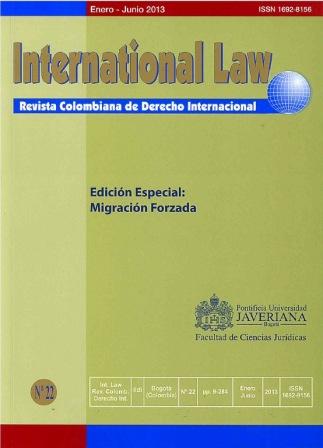Resumen
Esta contribución es el resultado de una investigación realizada en la primavera, otoño e invierno del lapso 2010/2011 en el marco de mi tesis doctoral sobre la normatividad de Uganda y Colombia en cuanto al tema del desplazamiento forzado, complementada con documentos sobre nuevos hallazgos. La contribución pretende presentar contenidos y principios de la política ugandesa para población desplazada y reflexionar sobre similitudes y diferencias con la normatividad colombiana sobre el tema del desplazamiento forzado. La investigación se llevó a cabo de forma cualitativa e incluyó la revisión crítica de documentos y de la literatura. Adicionalmente, se realizaron entrevistas semiestructuradas con expertos de instituciones nacionales y locales de los gobiernos respectivos, así como de varias ong y organizaciones internacionales, con personas en situación de desplazamiento y en proceso de retorno o reasentamiento y con líderes tradicionales o locales. La conclusión es que la política ugandesa sobre desplazamiento forzado representa un marco orientado a objetivos de desarrollo, contrario al modelo de Colombia, enfocado en brindar asistencia pero con un fuerte apoyo de actores externos, como entidades de cooperación internacional, lo cual no ha ocurrido al grado esperado hasta ahora. Las medidas para ofrecer soluciones a los desplazados comenzaron con un enfoque en infraestructura pública que no consideró de manera suficiente las necesidades de la población desplazada para garantizar condiciones dignas. Esto indica la necesidad de una mayor orientación hacia las necesidades de la población desplazada.
Esta revista científica se encuentra registrada bajo la licencia Creative Commons Reconocimiento 4.0 Internacional. Por lo tanto, esta obra se puede reproducir, distribuir y comunicar públicamente en formato digital, siempre que se reconozca el nombre de los autores y a la Pontificia Universidad Javeriana. Se permite citar, adaptar, transformar, autoarchivar, republicar y crear a partir del material, para cualquier finalidad (incluso comercial), siempre que se reconozca adecuadamente la autoría, se proporcione un enlace a la obra original y se indique si se han realizado cambios. La Pontificia Universidad Javeriana no retiene los derechos sobre las obras publicadas y los contenidos son responsabilidad exclusiva de los autores, quienes conservan sus derechos morales, intelectuales, de privacidad y publicidad.
El aval sobre la intervención de la obra (revisión, corrección de estilo, traducción, diagramación) y su posterior divulgación se otorga mediante una licencia de uso y no a través de una cesión de derechos, lo que representa que la revista y la Pontificia Universidad Javeriana se eximen de cualquier responsabilidad que se pueda derivar de una mala práctica ética por parte de los autores. En consecuencia de la protección brindada por la licencia de uso, la revista no se encuentra en la obligación de publicar retractaciones o modificar la información ya publicada, a no ser que la errata surja del proceso de gestión editorial. La publicación de contenidos en esta revista no representa regalías para los contribuyentes.


